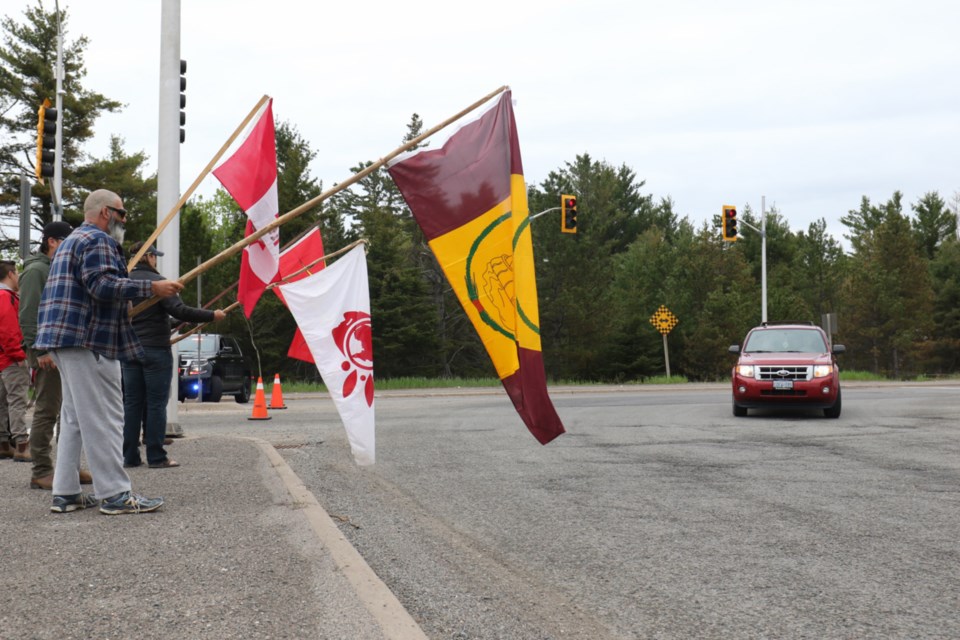SAULT STE. MARIE — People gathered at the intersection of Highway 17A and 17B Monday to protest the Indigenous rights framework proposed by the federal government - an imposed framework, its detractors say, that will place inherent Indigenous rights and title under Canada’s constitution.
“The Canadian government is imposing on our people, based on 10 principles that they developed,” said former Batchewana First Nation Chief Vernon “Champ” Syrette while addressing the crowd Monday. “They never consulted our people, nobody come and ask me to have these things developed and imposed upon me and my grandchildren, your grandchildren - and this is who it’s going to impact.”
The protest in Sault Ste. Marie is part and parcel of a larger, national call to action that will see similar protests happening across Canada Monday.
Batchewana First Nation Chief Dean Sayers told onlookers that his First Nation rejected the proposed federal framework outright during a special chiefs-in-assembly meeting hosted by the Assembly of First Nations (AFN) in Vancouver last summer, arguing that the nation-to-nation relationship with Canada would be minimized by placing that relationship under section 35 of Canada’s constitution.
“Don’t be fooled into thinking that the only way we’re going to be able to move forward is by having the foreign government recognize your place on our lands,” Sayers told the crowd. “We don’t need to be legislated to be recognized under Canada’s constitution.”
Sayers says it’s time for Indigenous people to organize and educate themselves about what’s really at stake, and is calling for an end to lateral violence in the name of a unified voice.
“We’re not the enemy. It’s the settler governments that are imposing on us that are the ones that need to be addressed,” Sayers said. “We need to stop the lateral violence, the inter-agency attacks - stop attacking the AFN, the Chiefs of Ontario, AIAI [Association of Iroquois and Allied Indians], the chiefs.”
Quinn Meawasige, who also spoke during Monday’s event, calls the Indigenous rights framework a continuation of the ‘white paper’ - a policy paper introduced by Prime Minister Pierre Trudeau and Minister of Indian Affairs Jean Chretien back in 1969 that was designed to strip Indigenous peoples of their special legal status, convert reserve land to private property and abolish the Indian Act altogether, among other sweeping changes.
“In 1969, the Pierre Trudeau government introduced the white paper,” said Meawasige. “So this legislation, the Indigenous rights recognition framework, is a continuation of that legislative assault by settler governments to completely eliminate and eradicate the Indigenous person, the Indigenous identity - both legally and physically.”
“So this ongoing resistance, this ongoing effort and strength demonstrated by everybody here lets us know that the prayers of the ancestors - those that came before us - lives within us, and that they will not die with us.”
Sayers, meanwhile, says there will be continued action opposing the imposed framework.
“We will reject the Indigenous rights framework, we won’t condone this paternalistic attitude of the crown - and we will take control again,” he said.
Last June, the Yellowhead Institute - an Indigenous think-tank committed to analyzing Indigenous policy and politics - released a detailed report about the Indigenous rights framework, calling out the federal government for ignoring issues surrounding treaty obligations and land restitution.
The Association of Iroquois and Allied Indians - which counts Batchewana First Nation among its member nations - has also created a website opposing the proposed framework.
